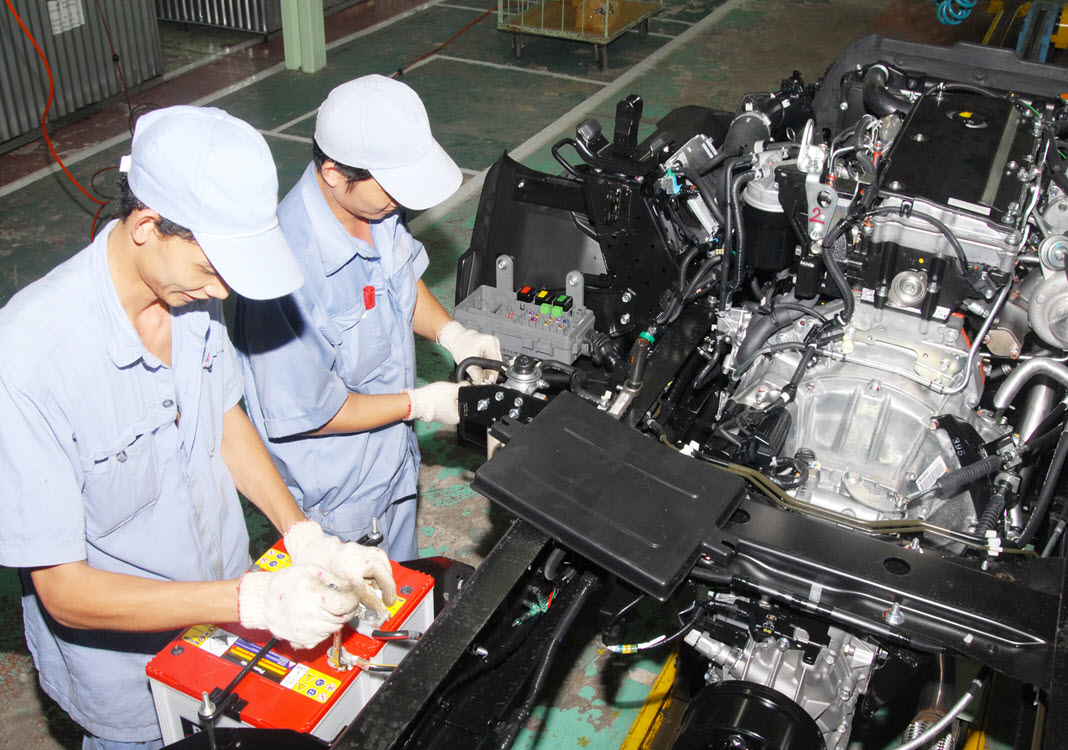The Government is mulling over the implementation of tax and credit policies aiming to boost domestic automobile assembly and manufacturing industry. Specifically, research is being conducted to adjust the excise tax which does not include the value of domestically produced components in the dutiable value of automobiles or to form a preferential credit package for the automobile and supporting industry. However, these attempts are controversial.
What piques public opinion’s interest is that the possibility of the supporting measures concerned. In other words, it is whether such intent will face opposition from Vietnam’s trading partners which are exporting automobiles and components into the market citing violation of World Trade Organization (WTO) principles and bilateral/multilateral trade agreements.
This problem should be tackled by a review of the more or less similar cases judicialized by WTO.
October 10, 1996, Europe Community (EC), Japan and the United States all requested consultations with Indonesia regarding the country’s “Program 1933” and “National Motor Program 1996.” The first program sought to reduce or cut import tax for automobile components based on localization rate. Meanwhile, the other aimed to provide benefits for domestic auto assemblers, such as exemption from excise duty or import tax if the localization rate was met. Their ultimate objectives were to raise the prices of imported automobiles versus their domestic counterparts.
The plaintiffs believed that the two programs had violated WTO provisions on subsidies and countervailing duties, which severely discriminated between domestic and imported products. The WTO delivered verdicts mostly in favor of the complaints filed by the countries against Indonesia. Finally, Indonesia had to be obliged to accept the judgements and claimed to have issued a new auto policy that fully complies with WTO rulings and recommendations in July 1999.
In March and April 2006, the European Commission, the United States and Canada lodged their complaints to WTO against China’s imposition of measures negatively affects these countries’ auto exports to China. Auto parts used to assemble cars sold in China were taxed on the same level as imported cars, if they were imported in excess of a certain maximum threshold, which was to encourage consumers to buy domestic cars if they used more domestic components. Several other countries including Japan, Australia and Mexico later joined the case.
In September 2008, China appealed WTO decision on the country’s violations. However, the WTO final judgements in December maintained the majority of the previous rulings. In August 2009, China announced the implementation of a new decree that terminated the enactment of previously related auto parts import provisions, and adhered to WTO rulings and recommendations.
With regard to Vietnam, a failure to include the value of domestically produced parts in the taxable excise prices for cars, or the provision of a preferential credit package is only a variation of the above solutions which is finally to discriminate or raise prices of imported cars, which thus makes domestically produced cars cheaper than imported counterparts.
In principle, such violations against WTO principle of fair treatment may be brought to court by concerned countries. Let’s hope that the size and impact of Vietnam’s policies are in fact too negligible to lodge a complaint against them.
Should we continue the protectionism?
In fact, despite being violations against WTO rulings, protectionist policies, such as localization rate requirements, are still in place in developed countries—Australia, Canada and other European countries, to name but a few.
Now comes this question. Should such protectionist policies in Vietnam in favor of the domestic automobile industry be maintained or modified? It also should make clear that the protectionism for the automobile industry, including the latest attempt, is not entirely new. In fact, many policies and solutions have been proposed and implemented in Vietnam during the past 30 years, including the localization rate policy. And we have already known the results.

Therefore, instead answering the question as to whether automobile industry protection policies should be continued, why not deal with a more practical and immediate question. Why shouldn’t we learn from the past failed attempts to reach a wise decision to end protectionism, lower import taxes and open the domestic market to free competition?
Let’s look at some empirical research results in the world to reinforce the recommendation to end this type of protectionism. Many research projects have indicated the failure of policies on localization rates designed to spur the development of domestic supporting industries, or reduce production and exports of finished products, and reduce the reliance of domestic firms on imported components and accessories(1). The same was applicable to Indonesia, known for her inward-looking economic policies, including the protection for the domestic automobile industry.
The reasons for the failure abound: laws and regulations were poorly enforced; domestic component producers did not have incentives to innovating or improving product quality due to a lack of competition; and domestic carmakers still relied on imported components of high quality but at more expensive prices, which resulted in uncompetitive prices and low domestic consumption and export.
On the contrary, if the domestic auto market is liberalized as soon as possible and non-tariff barriers such as excise tax, which are still in vogue, can be reduced, ASEAN countries in general and Vietnam in particular may be able to significantly increase their investment, consumption, export sales, employment rate and GDP by 2025(2).
By Chau Phan
(1)https://www.iseas.edu.sg/images/pdf/ISEASEWP2016-04Negara.pdf
(2)https://www.oxfordeconomics.com/my-oxford/projects/321360











